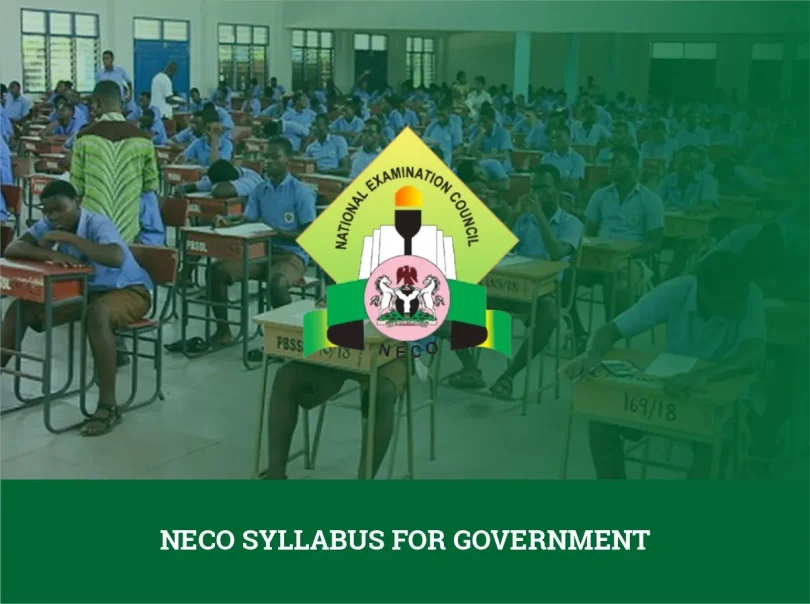Are you searching for the NECO Syllabus for Government, and you do not know where you can find it? Search no further, as information concerning the NECO syllabus for Government can be found right here on this page.
It is recommended that candidates who are aspiring to write the NECO Government examination should prepare for the examination using the right study materials. This is the right guide that candidates can use in preparing for the examination. It contains the sections, topics, key focus areas, aims, and objectives of the subject.
Having a soft copy or hard copy of the NECO syllabus for Government is a must for all candidates who will be writing the examination. This will help reduce your workload while preparing for the exam and put you on the right track to read only on the key focus areas. If you do not want to study excessively and out of context, then you need the NECO syllabus for Government to guide your preparation.
Overview of the NECO Syllabus for Government
Here is a comprehensive overview of the NECO Government Syllabus for examination, organized into two main sections for clarity and ease of study:
Section A: Elements of Government
| Topic | Key Focus Areas |
|---|---|
| 1. Meaning and Scope of Government | Government as an institution of the state (definition, features, structure, functions)<br>- Government as a process or art of governing<br>- Government as an academic field of study (reasons for studying government) |
| 2. Basic Concepts and Principles of Government | Basic concepts: State, Society, Nation, Power, Authority, Legitimacy, Sovereignty, Democracy, Political Culture, Socialization, Communalism, Feudalism, Oligarchy, Liberalism, Socialism, Communism, Capitalism, Fascism, Aristocracy, Totalitarianism (meanings and features)<br>- Basic principles: Rule of Law, Fundamental Human Rights, Separation of Powers/Checks and Balances, Constitutionalism, Political Participation, Representative Government, Centralization and Decentralization (Delegated Legislation, Devolution) |
| 3. Constitutions | Definition and sources<br>- Functions<br>- Types and features: Written and Unwritten, Rigid and Flexible |
| 4. Organs of Government | The Executive, Legislature, and Judiciary: types, structure, composition/membership, functions, powers, and limitations<br>- Judicial independence |
| 5. State Structure and Characteristics of Government | Types: Unitary, Federal, Confederal, Presidential (Non-parliamentary), Parliamentary (Cabinet), Monarchical, Republican<br>- Meaning, features, merits, and demerits |
| 6. Citizenship | Meaning and modes of acquisition<br>- Rights, duties, and obligations of citizens<br>- Means of safeguarding citizens’ rights |
| 7. Political Parties and Party Systems | Political parties: definition, organization/structure, functions<br>- Party systems: definition, types, merits, and demerits |
| 8. Pressure Groups, Public Opinion, and Mass Media | Pressure groups: definition, types, modes of operation, functions<br>- Public opinion: definition, formation, measurement, importance<br>- Mass media: definition, roles, impact |
| 9. Electoral Systems, Processes, and Electoral Management Bodies | Elections: meaning, purpose<br>- Franchise: meaning, limitations<br>- Types of electoral systems: advantages and disadvantages<br>- Electoral management bodies: definition, functions, challenges |
| 10. Public/Civil Service Administration | Public/Civil Service: meaning, structure, characteristics, functions<br>- Public/Civil Service Commission: meaning, functions<br>- Public corporations: definition, purposes, functions, control, challenges, need for commercialization and privatization<br>- Local governments: meaning, structure, purposes, functions, sources of revenue, control, problems |
Section B: Political and Constitutional Developments in West Africa and International Relations
| Topic | Key Focus Areas |
|---|---|
| 11. Pre-Colonial Political Systems | Structural organization of political systems in Nigeria (Hausa/Fulani, Yoruba, Igbo), Ghana (Akan, Talensi), Sierra Leone (Mende, Temne), The Gambia (Wolof, Mandingo, Jola), Liberia (Vai, Kru) |
| 12. Colonial Administration | British colonial policies: Crown Colony, Protectorate, Indirect Rule<br>- French colonial policies: Assimilation, Association (Loi Cadre)<br>- Impact, advantages, and disadvantages of colonial rule |
| 13. Nationalism in Candidates’ Countries | Meaning and factors of nationalism<br>- Key nationalist leaders and movements<br>- Contributions to independence |
| 14. Constitutional Developments | Pre-independence constitutions: features, merits, demerits<br>- Post-independence constitutions: origin, features, strengths, weaknesses<br>- Countries covered: Nigeria, Ghana, Sierra Leone, The Gambia, Liberia |
| 15. Development of Major Political Parties | Formation, objectives, sources of finance, achievements, failures<br>- Countries covered: Nigeria, Sierra Leone, The Gambia, Liberia |
| 16. Military Rule | Causes and effects of military regimes<br>- Military rule in Nigeria, Ghana, Sierra Leone, The Gambia, Liberia |
| 17. Federal/Unitary Systems of Government in West Africa | Origin, factors, structure, features, problems<br>- Countries covered: Nigeria, Sierra Leone, The Gambia, Liberia |
| 18. Foreign Policies of Candidates’ Countries | Definitions, objectives, advantages, disadvantages<br>- Countries covered: Nigeria, Ghana, Sierra Leone, The Gambia, Liberia |
| 19. International Organizations | United Nations (UNO), Commonwealth, African Union (AU), ECOWAS<br>- Aims, objectives, achievements, problems |
Examination Structure
Paper 1: 50 multiple-choice questions covering the entire syllabus. Duration: 1 hour. Total Marks: 40.
Paper 2: Essay-based with two sections:
- Section A: Elements of Government – 5 questions; answer any 2.
- Section B: Political and Constitutional Developments in West Africa and International Relations – 5 questions based on the candidate’s country; answer any 2.
- Duration: 2 hours. Total Marks: 60.
Recommended NECO Textbooks for NECO Government
For the NECO Government examination, the following textbooks are widely recommended to align with the NECO syllabus and effectively prepare students:
- Essential Government by C. C. Dibie – A comprehensive and widely used textbook that covers key topics in Nigerian and international government.
- Government for Senior Secondary Schools by M. O. Oyediran et al – This textbook offers detailed explanations of governmental structures and political processes, suitable for senior secondary students.
- Concise Government for Senior Secondary Schools (Fourth Edition) by Akin Adegbola, Tola Atolagbe & Olayiwola Owolabi – This book provides a succinct overview of government concepts, tailored for senior secondary school curricula.
Conclusion
A thorough understanding of the syllabus enables students to focus their studies effectively, ensuring comprehensive coverage of all examinable areas. By diligently studying the outlined topics and practicing past questions, candidates can enhance their preparedness and confidence, ultimately leading to success in the NECO Government.







Leave a Comment